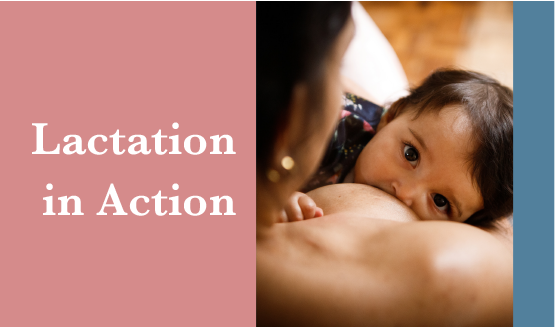
The estrobolome is a collection of influential bacteria, fungi, and viruses (part of the microbiome) in the gut that impact estrogen release and hormonal function. This delicate balance of bacteria has a significant impact on estrogen creation. This influences the operation of the reproductive system, regulation of body fat, brain function, and cardiovascular and bone health. The estrobolome also plays a major role in the health and function of the mammary gland. As much as we know about the microbiome, not enough attention has been paid to the relationship of the estrobolome and lactation success. Gut dysbiosis is now recognized as playing a role in a baby’s food sensitivities and allergies, but it is now time to look at the microbiome’s impact on lactation itself and the the long-term health of the mammary gland regarding breast cancer. This presentation addresses what we know now about the estrobolome, how it functions, it’s relationship with reproductive organs, potential impacts on the mammary function, and how we can create positive change in the gut for optimal estrobolome performance. 1 L Cerp (IBLCE Content Outline: I, II, III, IV)
Jen will share results from her study of Lactation Consultant practice, including barriers they encountered in their role, those that created disconnection. She will also introduce some discoveries about what assisted in promoting breastfeeding support.
After this presentation, participants will be able to:
1 L Cerp (V, VII)
Food allergy has been increasing in the past two decades, with Australia having the highest prevalence per capita worldwide. In our roles as IBCLCS and other health care professions it is therefore likely that we will encounter a dyad diagnosed with allergies, necessitating the need for an understanding of the various presentations.There are two types of food allergy: IgE and non-IgE, with either immediate or delayed reactions. FPIES (or Food Protein-Induced Enterocolitis Syndrome) is a subset of non-IgE food allergy and has been increasingly diagnosed in recent years. Transmission of food allergens across breastmilk to the infant has been acknowledged in literature, however there is conflicting information about whether maternal dietary modification is necessary in FPIES. This presentation will outline the history, aetiology, contemporary research and guidelines on FPIES in the breastfed infant. It will also include a case study of the presenter’s own child, who developed FPIES as a young infant. 0.75 L Cerp (I, III, V, VII)
With the rise of the digital era, it was only a matter of time before technology would place a strategic eye on women/people with breasts and uteri. FemTech means anything and everything that involves the technology, diagnostics, software, and services involving menstruation, fertility, adoption, pregnancy, fertility, or womyn’s health. The industry is approaching a $100 Billion market per year. This exploding area of digitized health support has many celebrating, however, just as many people worry about issues such as privacy and surveillance. There are also more profound questions involving intersectionality, equitable access, and exploitation of segments of the population that FemTech can take advantage of or leave out altogether. Join Laurel Wilson, lactivist and avid research reviewer, on this journey through some of the current lactation and perinatal FemTech available, and implications in the world of lactation.
1 L Cerp (IBLCE Content Outline: V, VI)
A humorous and introspective reflection on breastfeeding support available to women, this session will offer an insight to the current landscape of breastfeeding support, with identification of structural barriers to effective support, coming together to provide provocations for improved future practice.
Participants will be able to critically reflect on their own practice in supporting breastfeeding and will be able to optimise their abilities in protecting and promoting breastfeeding.
1 L Cerp (IBLCE Content Outline: V)
Who hasn’t heard of the microbiome lately? New research suggests that the microbiome plays an important role in our gut health, communication between the gut-brain axis, mood stability, even cardiac health. This session focuses on how humans seed the gut microbiome during the critical thousand days of a baby’s life and why human milk plays such a vital role in creating a healthy gut and ultimately positive long-term health outcomes.
1 L Cerp (IBLCE Content Outline: I, II, III, IV)
Jen Hocking
Jen is a registered nurse and midwife who is course coordinator of and lecturer in the Bachelor of Midwifery program at the Australian Catholic University (Melbourne). Jen’s PhD was a focused ethnographic study examining the clinical practice of Lactation Consultants who provide support and care for breastfeeding women in Melbourne, Australia.

Laurel Wilson
Laurel Wilson is a TEDx and international speaker, author, perinatal expert, lactation consultant, and integrative health coach with over three decades of experience in maternal-child health. She served as the Executive Director of Lactation Programs for CAPPA for 17 years and was a member of the Board of Directors for the United States Breastfeeding Committee from 2016 to 2019. Currently, she serves on the Advisory Boards for InJoy Health and the Colorado Breastfeeding Coalition. Laurel owns MotherJourney, an organization dedicated to training perinatal professionals in integrative and holistic approaches to the perinatal period. She holds a degree in Maternal Child Health: Lactation Consulting and is an IBCLC. An accomplished author, Laurel co-wrote The Attachment Pregnancy and The Greatest Pregnancy Ever and was the original editor of the CAPPA Lactation Educator Manual. She also contributed to Round the Circle: Doulas Talk About Themselves. Laurel has a passion for blending the latest scientific discoveries with the mind-body-spirit wisdom of traditional practices.

Kath Angus
Kath Angus is a midwife, lactation consultant and breastfeeding counsellor with ABA. Kath has been active in community breastfeeding support for over ten years and has also spent twelve years working in early childhood education, so is passionate about practices shaping early life.

Naomi Drew
Naomi is an experienced registered nurse and IBCLC, with a background of emergency and neonatal nursing. She certified as an IBCLC after experiencing the ups and downs of feeding her first two children, and when her third child experienced multiple food allergies, she knew she wanted to change careers to allergy and immunology nursing. She has been a registered nurse in a busy private allergy clinic for the past five years, caring for children and adults with allergic and dermatological conditions. She understands the challenges which accompany caring for a child with complex medical and lactation issues. Since 2014 Naomi has operated her private practice clinic Aspire Lactation, caring for families with home visits across Brisbane. After completing post-graduate studies in neonatology and allergy nursing, she is currently undertaking a Master of Public Health at James Cook University.